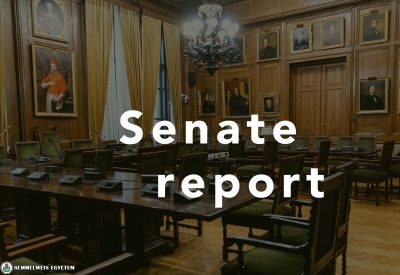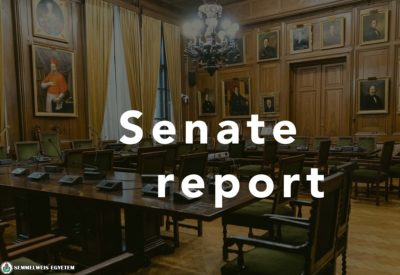Modifications to various provisions of the SZMSZ were on the agenda of the meeting. Accordingly, in honor of the current anniversary year, the rules on the use of the university’s symbols and regalia have been included in the regulations. The new rules declare that at traditional university ceremonies (opening of the academic year, Doctor Honoris Causa ceremony, Dies Academicus), as well as on other occasions determined by the rector, the original university sceptre and rector’s chain of office are to be used. A further change is that the chancellor, the vice-deans and the senators will also receive ceremonial gowns to wear. Other changes to the SZMSZ included administrative modifications relating to the creation of the Institute of Translational Medicine and the Department of Medical Imaging, which were approved at the August meeting of the Senate. Furthermore, changes were made to allow the university – with the approval of the Doctoral Council – to enter into agreements with other outstanding institutions or companies on taking part in PhD programs.
Senators voted to approve the chancellor’s report on the finances of the university for the first half of 2019, according to which its financial situation is stable and there is no need for any university-wide corrective measure. As opposed to the time-proportional HUF 1.2 billion deficit planned in the 2019 executive budget, the university closed the first half of the year with a HUF 2.16 billion surplus. The main reason behind the improved balance is that the spending funds approved by the Senate have not been used to the extent planned by organizational units. The savings and the approved funds are available at the units, and can be used in a reasonable and responsible fashion, the chancellor pointed out. Before approving the proposal, the Senate unanimously emphasized the importance of retaining human resources.
The body accepted the university’s 2019 asset management plan, following earlier approvals by the consistory and the managing authority.
The modified course requirements of the Faculty of Medicine for the 2019/20 academic year were also approved, in line with the ongoing curriculum reform. The 1200-page document lists in detail the curriculum elements for each course.
The Senate also voted on various personnel changes affecting committees, and provided its opinions in various ongoing applications for executive and lecturer-researcher positions. It also decided on the awarding of the 2019 Semmelweis Innovation Awards in four categories.
Pálma Dobozi
Translation: Tamás Deme
Photo: Attila Kovács – Semmelweis University


